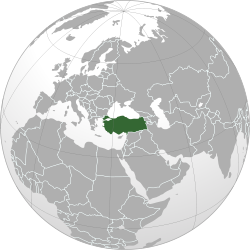Turkey: Will AKP Government Crack Down On Military’s Business Interests?
By Eurasianet
By Dorian Jones
One of the defining achievements of Justice and Development Party’s tenure in power in Turkey has been forcing the country’s once omnipotent army firmly back into the barracks and out of political life. Yet the military’s economic power has been largely left untouched.
Whether you buy a chocolate bar, insurance, or a car in Turkey, it is likely that it was produced by a company linked to the OYAK, the Turkish Armed Forces Assistance and Pension Fund.
“It remains a bizarre, unaccountable institution,” said Lale Kemal, an expert on the Turkish army and Ankara bureau chief of the Taraf newspaper, a national publication critical of the military’s previously unchecked power. “It is like the old days of Latin American countries, or in China or in Egypt, where you have the army owning companies, which has nothing to do with the rule of law or democracy.”

OYAK’s dealings are now coming under growing political scrutiny. In June, Justice and Development Party (AKP) spokesperson Huseyin Celik announced that parliament will scrutinize the pension fund’s “existence and function.”
Under an AKP-led campaign, 68 serving generals, about a fifth of the country’s top officers, are languishing in jail on trial or awaiting trial for various alleged coup plots. Turkey’s unprecedented investigations have largely driven the army out of the political arena. But political scientist Cengiz Aktar of Istanbul’s Bahçeşehir University says moving against the army’s economic power is crucial. “Demilitarization is a very, very long process. Without abolishing the financial and legal privileges of the army, we won’t have a perfect demilitarization process.”
Army officers founded OYAK in 1961, months after the country’s first military coup, to provide a pension for all soldiers. Troops contribute 10 percent of their pay to the fund.
Over the years, OYAK has evolved into an economic leviathan. According to its 2009 annual report, the most recent, it employs nearly 30,000 people and has assets worth more than $15 billion. Its interests span 60 companies, 28 of which it completely owns, with activities ranging from production of cookies to steel and cars. This year, the 4-millionth car rolled off the OYAK Renault production line in a joint collaboration that dates back to 1971.
Critics charge that the group’s success has been built on unfair competition. A report compiled in 2010 by the liberal-leaning Turkish Economic and Social Studies Foundation (TESEV) in Istanbul (“Military-Economic Structure in Turkey”) noted that while companies attached to OYAK pay taxes, OYAK itself is exempt from corporate tax, inheritance tax, income tax or stamp and excise duties. The report also claimed that “OYAK benefits particularly from the potentially high impact of the military’s political influence over the economy.”
In May, the AKP-friendly newspaper Yeni Şafak reported that prosecutors have found evidence that OYAK for years used the military’s intelligence center to monitor its business rivals’ phone calls.
The current OYAK chairperson, Yıldırım Türker, a retired lieutenant general, is in jail awaiting trial for his alleged role in the 1997 overthrow of an Islamist-led government. Ten employees working for an OYAK company have also been arrested for alleged involvement in the assassination of several senior judges.
Amid the growing allegations, OYAK claimed in April that it also is a conspiracy victim. “For a considerable time, it has been evident that efforts are being conducted against OYAK to mislead the public,” OYAK said on its website.
OYAK did not respond to a EurasiaNet.org request for comment. But in its 2009 annual report, it distanced itself from the military by saying it is not a part of the armed forces. The TESEV report asserts that such claims are unconvincing. “The [fund’s] 50 to 100-member board of representatives contains only military officers, and the 40-seat general assembly has only nine civilian members.”
Critics have also accused the group of being a feather bed for senior officers. “Retired generals, army relatives, their close associates are employed at OYAK companies, so this creates [an] opportunity for senior members of the armed forces,” charged Taraf bureau chief Kemal.
OYAK’s structure leaves even some soldiers disgruntled. In 2007, a group of non-commissioned officers brought a case before the European Court of Human Rights, claiming that senior officers received preferential treatment by OYAK.
“I think the problem for OYAK is it was being used as an almost employment agency for retired generals,” stated Gareth Jenkins, a security analyst based in Turkey. “The people who needed OYAK to work hardest . . . were the non-commissioned officers and junior officers. It is instead being used mainly for the benefit of higher ranks.”
With the investigation into alleged military coup plots ongoing, politicians and the media are increasingly questioning the group and the status it enjoys. But Jenkins predicts that “if the companies are somehow taken away from the army pension fund,” the “assets will be transferred to people [who] happen to be close to the ruling party.”
“One of the problems generally we’ve seen in Turkey in the last few years is the system remaining the same, but the ruling elite changing,” he said.
Critics contend that reform of OYAK is vital for democracy. “The fact that OYAK is unaccountable, untouchable, tells us Turkey has a long way to go to end the military tutelage system and to ensure the full civilian control of its armed forces,” declared Kemal, the journalist.
Dorian Jones is a freelance reporter based in Istanbul.
